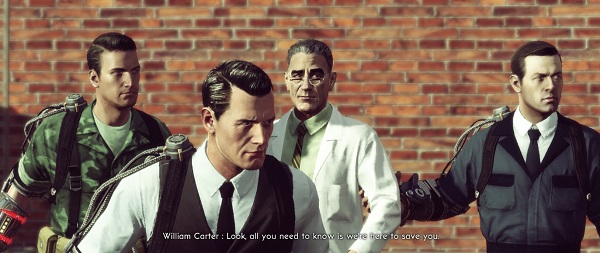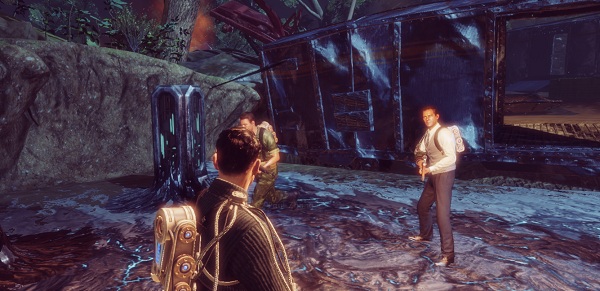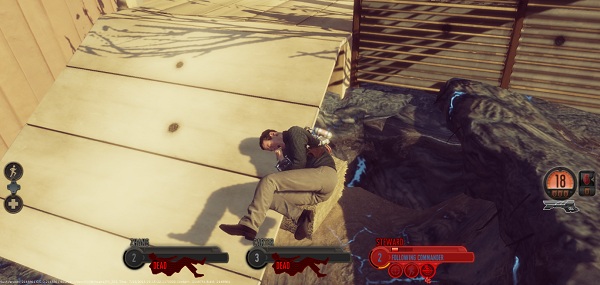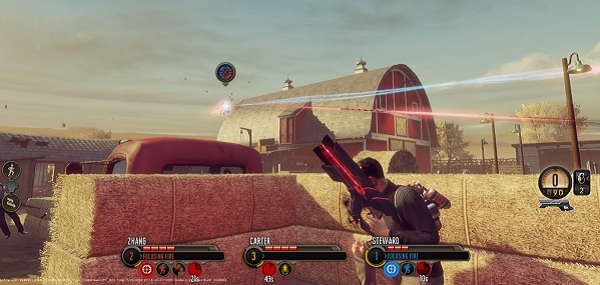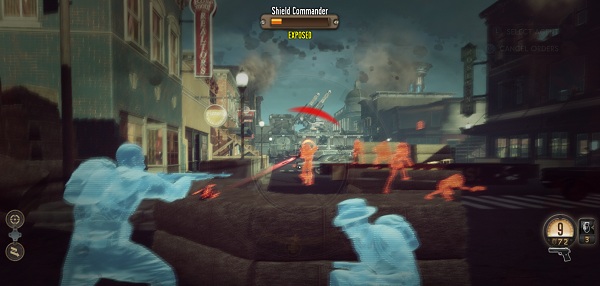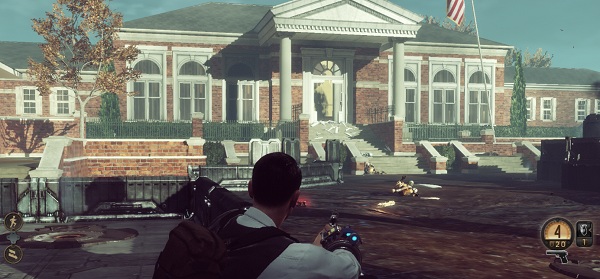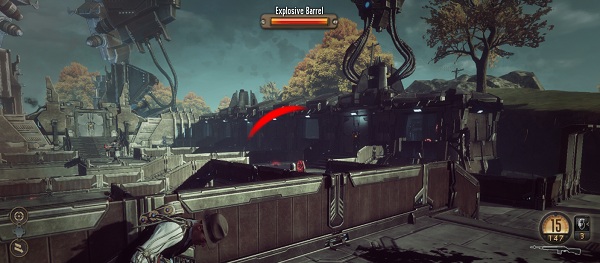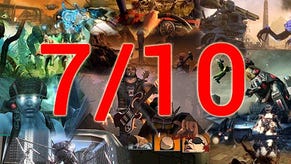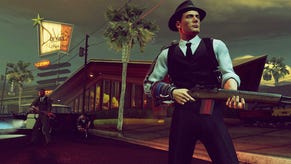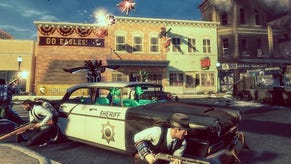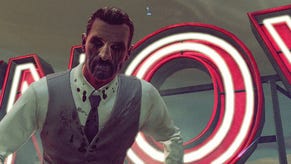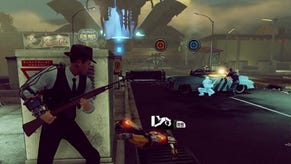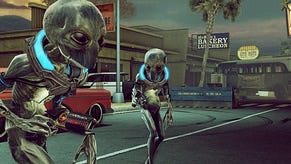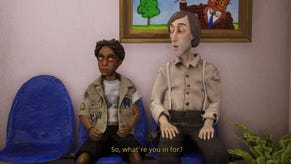Wot I Think: The Bureau - XCOM Declassified
Little Green (Mad) Men
It’d be a relief to spend a few days of gaming in the company of dapper sixties agents rather than gruff space marines. Sadly, the heroes of The Bureau, dress code aside, are space marines. They shoot monsters, then roll between carefully placed cover and magically summon turrets. There are tactics to be found, but are they in sufficient quantity to make the rest of the experience worthwhile? Here’s wot I think.
During the loud, plasma scorched opening half hour, I became convinced that the current XCOM cycle had jumped straight from last year’s excellent reboot to the Enforcer of the series.
The Bureau, swiftly stripped of its thematic threads and charm, begins with a dismal and disheartening room by room tour of dull third person shooting, sectoid bullet sponges and explosive barrels. As squads are introduced and tactical options expand, the game finds its feet, but they are encased in heavy workboots rather than natty dress shoes. Even at its best, The Bureau stumbles from mission to mission rather than striding.
The stakes are too high, too early. Rather than a tense, period take on The X Files or a Bodysnatchers serial, 2K Marin’s game is World War B (movie). Within an hour, a huge military base has been destroyed, leaving only six survivors who nuke the area to eliminate the invading Outsiders. A mountain is terraformed out of existence. More nukes are aimed at Washington DC while mysterious alien activity sends earthquakes trembling up and down the West Coast’s spine. Rather than abducting a couple of cows or the inhabitants of a small town, these aliens build giant structures wherever they go, including enormous gun batteries and factories.
How can these truths possibly be erased?
Pre-release footage of the game concerned me. Despite finding the concept of a historical XCOM intriguing, the combat resembled sorcerous sci-fi, with more glowing apparitions and magical technology than the soldiers of Enemy Unknown ever had at their disposal.
The first mission provides accompanying agents with high level powers, which must be earned when forming a new squad as soon as the game proper begins. Support chappies can generate shields, forming a bubble that protects nearby friendlies from enemy fire, and engineers can will a turret into existence. Along with the super tech, some agents can shout swears at aliens, which annoys them and makes them emerge from cover immediately, shaking their fists like enraged pensioners. It’s like taking the Green Lantern Bureau into battle, except these lot go in for replaced skin-tight space-onesies with stylish waistcoats and rakish hats (and, yes, being knocked over by an explosion blows the hat off, thankyouverymuch).
To use abilities, the player activates Battle Focus, which slows the game down, highlights all enemies and brings up a dial from which orders can be selected. Each agent’s commands take up a third of the wheel and the system works elegantly, the camera zipping to a position behind the character as the cursor moves into their quadrant. And then, as an order is given, it becomes apparent that the targeting cursor must be moved through the level like a person, becoming stuck on walls and requiring careful manoeuvring. It's slow and unnecessarily clunky, losing all of its elegance mid-way through the process, like a ballerina with sudden and explosive diarrhoea.
Basic human functions are available for selection - move here, shoot that thing and that thing only until it is dead – but the men of XCOM are not entirely stupid. They don’t use their magical powers unless the boss man tells them to, but they will use cover in their vicinity semi-intelligently and target threats appropriately.
The system is at its best when carrying out COMBO KILLS, which aren’t as obnoxious as they sound, despite the game flashing up a celebratory message whenever one occurs. They involve such joys as lifting an alien from behind cover, suspending it in the air, and then having a sniper perform a critical strike, killing it one hit. There are also happy tactical moments, such as realising how to take down a Sectopod effectively, using space and positioning to become Davids against Goliath.
The missions - which are fixed in place, and divided into optional and necessary – mostly have a similar pace. A Skyranger lands, an objective is relayed to the team, and then the three gents begin their hike through the scenery, which is mostly very pleasant indeed. Small town America is captured well, Rockwellian visions marred by ruptures in once quiet streets and corpses slumped by the soda pumps in malt shops. There are also rural idylls, though they too are littered with the dead.
Small groups of enemy infantry interrupt the journey, which usually leads toward a group of survivors to rescue or a device to capture/destroy. They’re no great challenge and each skirmish soon follows a pattern, with a few orders given but the bulk of the work carried out using the player’s own targeting skills.
The shooting is fine, nothing more, and I’m as confused as a chicken in a tumble dryer that I’ve spent more time targeting through a reticule than I have giving orders. My subordinates’ tendency to bleed out, far from the wound-sealing spray of a companion, is partly to blame. I’d rather take on tasks myself, to save the anxious dash across the scorched earth to perform a rescue. Death is permanent, which is distressing when a character is high level, though entry level replacements are free.
This, along with the ability of three agents (the maximum in a squad) to take out a hundred aliens in a single mission, causes almost any sense of the vulnerability and tension suggested by the period setting to evaporate faster than a cat in a faulty matter transporter. Occasionally, during an inter-mission base-wander, an important man will smoke a cigarette during a briefing or somebody refer to a female officer as a broad, but otherwise the XCOM staff could be almost anytime and anyplace.
There are a few evocative touches, such as the NASA-like control room, with ticker tape computing devices, but a menu or the antfarm cutaway of Enemy Unknown, would be a more pleasing solution to the game’s thin management portion. Hiring and equipping take place on a simple screen, but chatting to science and engineering personnel involves running around the base, occasionally spotting a speech bubble floating over somebody’s head and wondering if they have anything interesting to say or will simply repeat their usual spiel.
On the whole, the dialogue would be best flashed from memory using Will Smith’s Scientology stick. There’s a bracing early scene in which Carter finds that his new office mate (the surface is in such disarray that agents sleep together in the office, presumably under their desks) knows everything about his dark history. That’s because he’s read Carter’s file and THAT’S because all XCOM agents read each others’ files, because the better they know each other, the better they’ll work in the field. Well, OK, but probably not if your file has a comment attached to it, by Hoover, saying this:
"This one's aggressive, temperamental and defensive...I don't recommend him…the man used to be a hero but now he's busy destroying himself...he's not useful for much anymore except as an expendable asset."
Everybody knows that now. Everybody knows that Carter is a massive wanker who might be useful for a suicide mission but isn’t much cop for anything else. And then they find out he’s the guy they’ll be taking orders from when they go up against an army of aliens with superior technology. Vigilo Confido indeed.
There are a few strong beats during the story that suggest a stronger experience could be teased out of the raw ingredients. A conversation that muddies the line between immigration and invasion grabbed my interest, though it’s a strand without a satisfying conclusion, at least at the point I reached, having abandoned the fight shortly before the game’s conclusion.
It’s the repetitive nature of the combat that is the game’s undoing. Different sets of scenery, fresh skills and new equipment – packs, which provide various buffs, grenades and guns – fail to distract from the unchanging nature of the missions. Start, walk forward, engage and eventually encounter a mini-boss battle or wave-like defense task. Squad management doesn’t have the necessary depth to maintain interest throughout the campaign either, despite the fact that engineers can wear pink overalls.
Agents outside the main squad can be sent to carry out optional missions, which is a useful idea, though undercooked. As long as their combined level matches the mission difficulty they simply succeed and bring back a reward. There are occasional choices of skill, as in the new Enemy Unknown, but agents feel like functional objects rather than potential heroes. Even during a mission, should one die, a replacement can be beamed in at the next restock point, where ammo replenishment and equipment swaps are also carried out.
Then there’s the lack of a save function. Missions have checkpoints but one particular Sectopod battle that takes place after a couple of other encounters didn’t save my progress beforehand, meaning every failure meant replaying the same fifteen minutes over and over again. When so much of the game already feels like replaying the same fifteen minutes over and over again, that is an undesirable system.
The Bureau’s most disappointing aspect is its lack of thematic cohesion. It’s part Independence Day and part Spielberg’s War of the Worlds, with very little of the intriguing investigative horror of that trailer, so recently reappraised. The black silicoid blobs make an appearance, as both enemies and pets, bobbling around like angry tumbleweed. Infected human ‘sleepwalkers’, drooling and weeping ichor, are a high point, sinister versions of Alan Wake’s enemies, trapped in behavioural and speech patterns. But the smaller horrors sit alongside giant purple spires, pulsing with plasma energy – sights that can’t be scrubbed out of history with a black marker pen.
To play, it’s a serviceable exercise that lands in an odd middle ground between genres. It’s closest relatives are probably Mass Effect and Brothers in Arms, though lacking the good bits of the former and the enjoyable Hollywood historicity of the latter.
I’m almost convinced that there’s a good game in here somewhere, incubated for too much time or not for time enough. Opening mission aside, The Bureau isn’t terrible, but it comes across as a collection of small ideas without a unifying hand to make them whole, or to jettison the worst of them. Not terrible, but a failure in almost every way that matters.
Games often take up a place in my landscape of interests, even if I don’t particularly enjoy them. They have some points of interest that become useful for future navigation. Apart from its (enforced?) connection to XCOM, The Bureau may not. In a month’s time, where will the memories be? In truth - erased.

